
There is no doubt in my mind that Washington is ramping up its anti-China rhetoric, particularly in its recent moves toward Taiwan which it regards as a completely separate entity from China in complete contrast to China which regards Taiwan as part of itself. Let's look at two recent moves that Washington has made which will only push the "war" agenda closer to reality.
First, we have this bill from Senator Josh Hawley (Hawkley would be a better moniker), a member of the Senate Armed Services Committee:
The Arm Taiwan Act of 2021 would supply arms and training to "…accelerate deployment by Taiwan of the asymmetric defense capabilities required to deter or, if necessary, defeat an invasion of Taiwan by the People’s Republic of China, and for other purposes."
You may ask yourself why Washington has made this move. Here is their raison d'être for proposing the bill:
"It is the sense of Congress (and we all know that they are NEVER wrong about anything") that:
"The Department of Defense has warned that the Government of the People’s Republic of China may conclude that it can successfully invade and seize control of Taiwan in the latter half of the 2020s."
Note that there is a significant condition in this first justification of the bill; that China "may" conclude that it can successfully invade and seize control of Taiwan in the latter half of the 2020s. Then again, never let a possibility of war constrain Washington's pathological need to spend on its military.
Let's look at the additional Congressional findings being used to justify the bill:
"2.) In October 2021, the Minister of National Defense of Taiwan, Chiu Kuo-cheng, echoed these warnings when he stated that the People’s Republic of China—
(A) ‘‘is capable now’’ of invading Taiwan; and
(B) will have ‘‘lowered the costs and losses’’ associated with invading Taiwan ‘‘to a minimum’’ after 2025.
3.) If the People’s Republic of China were to invade and seize control of Taiwan, it would deal a severe blow to United States interests by—
(A) destroying one of the world’s leading democracies;
(B) casting doubt on the ability and resolve of the United States to uphold its security commitments;
(C) incentivizing other countries in the Indo-Pacific region to bandwagon with the Peo- ple’s Republic of China; and
(D) facilitating the formation of a regional order dominated by the People’s Republic of China in which the Government of the People’s Republic of China may—
(i) regulate or otherwise limit the abil- ity of individuals in the United States to trade in the Indo-Pacific region, which would have dire effects on the livelihoods and freedoms of such individuals; and
(ii) use the Indo-Pacific region as a secure base from which to project military power into other regions, including the Western Hemisphere.
(4) Taiwan’s proximity to the People’s Republic of China, coupled with investments by the People’s Republic of China in capabilities designed to delay intervention by the United States Armed Forces in support of Taiwan, means that Taiwan may be forced to delay, degrade, and deny an invasion by the People’s Republic of China with limited support from the United States Armed Forces for the initial days, weeks, or months of such an invasion.
(5) If Taiwan is unable to delay, degrade, and deny an invasion by the People’s Republic of China with limited support from the United States Armed Forces, especially in the initial period of war, then the People’s Republic of China may conclude that it 3 is, or may actually be, capable of –
(A) invading and seizing control of Taiwan before the United States or any other partner country of Taiwan is able to respond effectively, thereby achieving a fait accompli; and
(B) potentially rendering any attempt by the United States or any other partner country of Taiwan to reverse territorial gains by the People’s Republic of China prohibitively difficult, costly, or both."
The bill goes on to state that Taiwan needs asymmetric defense capabilities to "…improve the ability of Taiwan to defend itself, but also reduce operational risk to members of the United States Armed Forces under a Taiwan contingency." As such, Congress is encouraging other nations to sell, lease or otherwise provide appropriate asymmetric defense capabilities to Taiwan so that they can defeat an invasion by the People's Republic of China.
So, what will Taiwan gain from this bill if it is passed? Under the new "Taiwan Security Assistance Initiative", Congress will appropriate $3 billion annually over the period starting in fiscal 2023 and ending in fiscal 2027. Congress believes that this will provide Taiwan with equipment, training and assistance necessary to defend, delay, degradation and deny attempts by China's People's Liberation Army from entering Taiwan by sea, seizing control of a population centre in Taiwan and from seizing control of the gGovernment of Taiwan.
The materiel to be supplied to Taiwan includes but is not limited to:
(1) Mobile, ground-based coastal defense cruise missiles and launchers.
(2) Mobile, ground-based short-range and me- dium-range air defense systems.
(3) Smart, self-propelled naval mines and coast- al minelaying platforms.
(4) Missile boats and fast-attack craft equipped with anti-ship and anti-landing craft missiles.
(5) Unmanned aerial and other mobile, resilient surveillance systems to support coastal and air defense operations.
(6) Equipment to support target location, tracking, identification, and targeting, especially at the local level, in communications degraded or denied environments.
(7) Man-portable anti-armor weapons, mortars, and small arms for ground combat operations.
(8) Equipment and technical assistance for the purpose of developing civil defense forces, composed of civilian volunteers and militia.
Now, as promised, let's look at another key development in the pending war with China. In early 2021, Rep. Guy Reschenthaler (R-PA-14) introduced H.R. 1173 known as the "Taiwan Invasion Prevention Act" as shown here:
Under this bill which is now in the hands of the House Committee on Foreign Affairs, the President of the United States is authorized to use military force for the purpose of defending Taiwan against armed attack. This is being done because, it is the sense of Congress that:
"(1) Both the United States and Taiwan have made significant strides since 1979 in bolstering their defense relationship;
(2) the People’s Republic of China has dramatically increased the capability of its military forces since 1979;
(3) the People’s Republic of China has in recent years increased the use of its military forces to harass and provoke Taiwan with the threat of overwhelming force; and
(4) that it is the policy of the United States to consider any effort to determine the future of Taiwan by anything other than peaceful means, including by boycotts or embargoes, a threat to the peace and security of the Western Pacific area, and of grave concern to the United States."
Under the bill, the President is authorized to use the Armed Forces of the United States and take steps to protect Taiwan from the following:
"(1) Direct armed attack by the military forces of the People’s Republic of China against the military forces of Taiwan.
(2) The taking of territory under the effective jurisdiction of Taiwan by the military forces of the People’s Republic of China.
(3) The endangering of the lives of members of the military forces of Taiwan or civilians within the effective jurisdiction of Taiwan in cases in which such members or civilians have been killed or are in imminent danger of being killed."
So, basically, Congress and the Department of Defense are setting the stage for a war with China over Taiwan and are more than willing to sacrifice America's young men and women for yet another war without end just as the last war without end (nearly) has just wound down without a win. A war with a very well-armed and motivated People's Republic of China in "their backyard" will be a far different war than America's experience in Afghanistan as you can see here:
And, with China's possession of nuclear weapons, there is always a chance that these could be deployed in a desperate move to protect the homeland from a threat by American forces:
You can publish this article on your website as long as you provide a link back to this page.

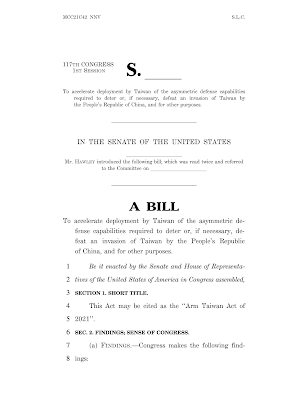
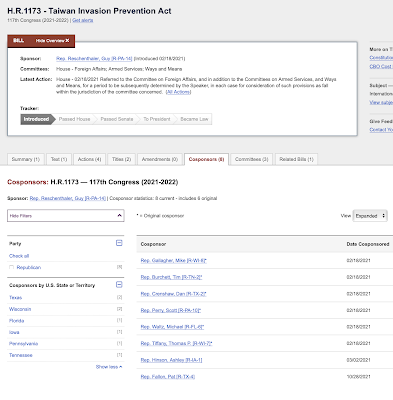
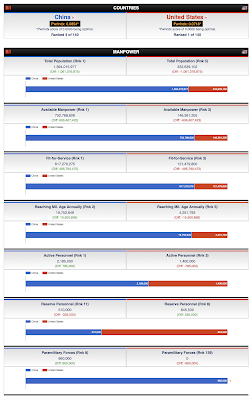
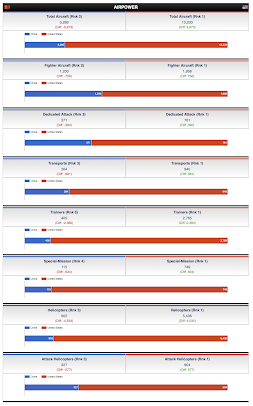
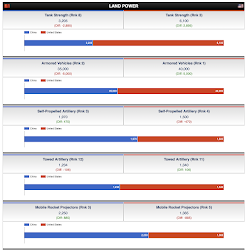
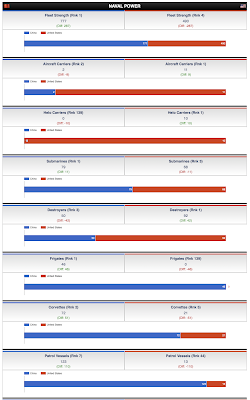
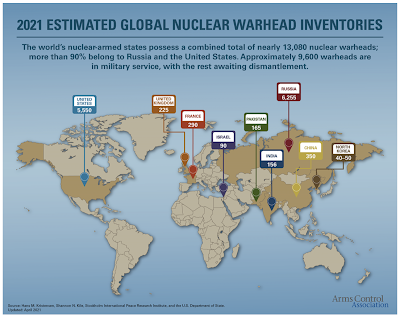
Be the first to comment